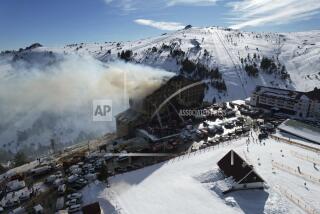U.S. Makes Arrests in Iraq Bombing
- Share via
BAGHDAD — U.S. authorities have detained several people in connection with Sunday’s deadly explosion outside the Baghdad Hotel -- as two more American soldiers died in continuing attacks against U.S.-led occupation forces here.
Seeking to prevent more deadly assaults, U.S. military leaders ordered a tightening of security around Baghdad on Monday, but violence flared in other parts of Iraq, including two unsuccessful assassination attempts against Iraqi government officials and an unusual spurt of attacks in the British-controlled city of Basra.
In a briefing with reporters Monday afternoon, a coalition spokesman said the FBI and Iraqi police -- which are working together in the investigation of recent car bombings -- arrested an unspecified number of individuals after the hotel blast, which killed eight people, including a suicide bomber.
Coalition spokesman Charles Heatly declined to say how many people were detained or whether they were suspected of orchestrating the attack.
The coalition is under growing pressure to catch those responsible for nine deadly bombings in Iraq since August -- including at the Jordanian Embassy in Baghdad, at a major shrine in the holy city of Najaf and at the United Nations headquarters in the capital.
U.S. officials say the attacks are being carried out by loyalists of deposed President Saddam Hussein or by foreign terrorists who have entered Iraq. All of the bombings remain unsolved.
Outside the Baghdad Hotel on Monday, Iraqi police armed with AK-47 rifles and U.S. soldiers in tanks kept visitors from entering the complex, though the busy commercial street in front of the hotel was reopened to traffic.
Giant concrete barriers, which had been toppled by the explosion, were restored to their places, and much of the debris, including several burned-out vehicles, was removed. Along the street, merchants who had fled their shops after the bombing returned to sweep up piles of shattered storefront glass.
Throughout the city, security measures were strengthened following the hotel bombing and a similar suicide attack Thursday at the Sadr City police station, in which eight people died.
U.S. tanks rumbled down residential streets, helicopters increased their patrols and drivers were subjected to additional checkpoints and searches, at times snarling downtown traffic. One hotel catering to Westerners deployed explosives-sniffing dogs and rooftop snipers for extra protection.
Nevertheless, Baghdad and other cities witnessed another day of violence, both in the so-called Sunni Triangle, where support for Hussein remains high, and in the Shiite-dominated south, where violent outbreaks have been less common.
In Tikrit, a U.S. soldier was killed and two more were wounded in a rocket-propelled-grenade attack, according to a military spokeswoman.
Two hours earlier, guerrillas used a makeshift roadside bomb and small arms to ambush a U.S. military convoy traveling near Jalula, in a desolate area 80 miles east of Tikrit. One soldier was killed and two were wounded.
In two incidents, three Iraqi government officials came under attack in Baghdad and Baqubah, just east of the capital.
Abdullah Shahad Jaburi, the governor of Diyala, narrowly escaped harm when a roadside bomb exploded near his home as he drove to work. A military spokesman said it was unclear whether Jaburi was the intended target, but Iraqi police were investigating it as an assassination attempt. The blast injured two policemen and a bystander.
Late Sunday night, two officials with the U.S.-appointed Iraqi Governing Council also escaped an apparent assassination attempt when their motorcade came under fire from a passing car.
Iraqi Oil Minister Ibrahim Bahr Uloum and Nabil Musawi, a deputy to Governing Council member Ahmad Chalabi, were not harmed in the attack, which occurred in the Mansour district of Baghdad, according to Mudar Shawkat, a top Chalabi aide.
In Basra, four British soldiers suffered minor injuries Monday when a series of explosive devices rocked the city. The explosions ended a lull there that had lasted several weeks.
Maj. Charles Mayo, a spokesman for the British forces, said three explosions were reported, two of them at about 9 a.m. on the city’s southwestern outskirts. One occurred 200 yards from a coalition facility.
Mayo said a soldier suffered minor wounds in one of the attacks. The third, smaller explosion went off an hour later outside a British base inside the city, slightly wounding three soldiers. Mayo said the blasts were under investigation.
Though British military officials said it was too early to know who was responsible for the attacks, both they and the newly revived Iraqi police force in the city said members of Hussein’s dismantled military were known to be in the city and had launched attacks in the past.
Also Monday, nearly 1,000 demonstrators in Fallouja, west of Baghdad, protested for the release of Sheik Jamal Shaker Mahmoud, a Sunni prayer leader at the Great Mosque there, who they say was arrested Monday by U.S. forces. A military spokeswoman could not confirm the arrest.
*
Times staff writer Tyler Marshall in Basra contributed to this report.
More to Read
Sign up for Essential California
The most important California stories and recommendations in your inbox every morning.
You may occasionally receive promotional content from the Los Angeles Times.













